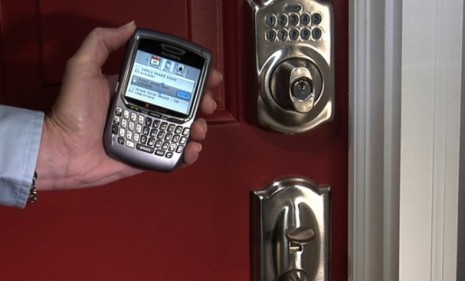Can smartphones replace house keys?
A new app promises to phase out your clattering keychain by allowing you to unlock your home from miles away

A free daily email with the biggest news stories of the day – and the best features from TheWeek.com
You are now subscribed
Your newsletter sign-up was successful
As if our smartphones weren't already doing enough, now they can eliminate the need for cumbersome, jangling house keys. Lockmaker Schlage has released a smartphone app that allows a user to unlock his home (provided it's equipped with special locks) using an iPhone. It's just one of a number of new systems that are threatening to make physical keys a thing of the past. Here, a brief guide:
How does it work?
With Schlage's "LiNK" system, and another recently introduced system called Lockitron from Apigy, a smartphone sends a signal over the internet to a small device attached to your home router. That device then wirelessly triggers the door locks. Both systems require the installation of special locks, which can be purchased as part of a kit for a few hundred dollars. Other systems, like OpenWays, replace the hotel card key, not the metal house key, allowing a user to unlock a hotel-room door by aiming his cellphone at it. These technologies are the "not-too-distant" cousins of the gadgetry that allows us to unlock a car with a key fob remotely.
The Week
Escape your echo chamber. Get the facts behind the news, plus analysis from multiple perspectives.

Sign up for The Week's Free Newsletters
From our morning news briefing to a weekly Good News Newsletter, get the best of The Week delivered directly to your inbox.
From our morning news briefing to a weekly Good News Newsletter, get the best of The Week delivered directly to your inbox.
How close do you have to be to the door?
LiNK and Lockiton can be used to unlock doors and let in a locked-out family member or friend from miles away. LiNK can also be used to control lights, security cameras, and heating and air-conditioning.
Are there any drawbacks?
Of course. If your smartphone's battery runs out of juice, or your home's internet connection goes down, you're out of luck. It may still be a good idea to hide a physical key outside, just in case. Plus, some say the technology is still "fairly cumbersome," requiring users to punch long codes into their phones. Near Field Communications may help, by allowing a user to simply wave a phone in front of a lock to gain entry.
A free daily email with the biggest news stories of the day – and the best features from TheWeek.com
Does this work with any smartphone?
Lockitron and Apigy both work across multiple platforms, from iPhone to Android, so long as the phone is able to connect to the internet. Lockitron can also be upgraded to work with a standard cell phone via text message. In May, Google gave a sneak peek of a home-automation system called Android@Home, which would, of course, be unique to Androids.
What are the potential applications?
There are many. Let in a locked-out friend without leaving work. Empty your purse of cumbersome keys. Never copy your keys for a houseguest again. The smartphone locks can also be set to expire for certain users, especially useful for vacation rentals or contract workers. On the hotel front, operators could eliminate the need for those pesky card keys, ultimately saving money and reducing the need for front desk staff. "We're making a virtual copy of a key," says Cameron Robertson, an Apigy co-founder. "It allows you to give people instant access — temporary or permanent."
Sources: Forbes, GoKeyless.com, Lockitron.com, New York Times
Editor's Note: This article orignally misstated the mechanism by which Lockitron works. It has since been revised. We regret the error.
-
 Quiz of The Week: 14 – 20 February
Quiz of The Week: 14 – 20 FebruaryQuiz Have you been paying attention to The Week’s news?
-
 The Week Unwrapped: Do the Freemasons have too much sway in the police force?
The Week Unwrapped: Do the Freemasons have too much sway in the police force?Podcast Plus, what does the growing popularity of prediction markets mean for the future? And why are UK film and TV workers struggling?
-
 Properties of the week: pretty thatched cottages
Properties of the week: pretty thatched cottagesThe Week Recommends Featuring homes in West Sussex, Dorset and Suffolk